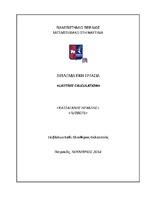Laytime calculation

View/
Subject
Ships -- Cargo ; Freight and freightage ; Ναύλωση και ναύλος ; Πλοία -- Φορτίο ; Ναυλοσύμφωνα ; Lay daysAbstract
The charter party is the contract agreement, which regulates trade relations between the charterer and the shipowner. The agreement contains provisions, regarding the type of charter and conditions which is due to be completed. It describes in detail, both the claims and obligations of both dealing parties. In commercial shipping, it is important to respect the agreed deadlines. The news affects both the owner and the charterer, resulting gains and rewards. Failure to compliance with deadlines may result in a breach of contract, losses and penalties. Apart from the duration of the trip, an important factor in achieving the schedule of charters, is the time required for loading and discharging of goods. This time at the port is called laytime. Laytime is the period of time permitted by the shipowner to perform loading or discharging. The laytime determined by a contract, which is the exchange of obligations and the distribution of risk between the owner and the charterer. The features and calculation of laytime is vital importance for commercial shipping. Each contracting party agrees to accept the risk in some cases provided. Laytime begins when the ship reaches at the destination has been agreed, it is ready to load or discharge and has submitted a valid “Notice of Readiness (NOR)”. The laytime can begin according to the clauses of the contract. Demurrage which is the agreed amount, is paid to the owner in relation to the delay’s of vessel beyond the laytime, on which, owner is not responsible. Only in case there is an exception clause in the charter party will prevent disbursement of funds of demurrage and only if the claim be paid within the time period stated in the contract. If not sent within this period, will not be accepted and will not be paid. preparation of claim requires prior contracts, the ship's documents, bills of lading and proof of "demurrage rate". Although this issue is very skilled and very technical, deserve our attention because the sloppiness of issue during the negotiations for the formation of charter party, both on the part of charterer and the side of shipowner, can bring about high economic losses. Usually, time in shipping industry, is money. Therefore, shipowner who not negotiated diligently “laytime calculation” for his ship, can lose valuable time due to incompetence or negligence of charterer. On the other hand, if charterer, had delivered the ship to owner, of the earlier agreed time, rightly he could claim financial compensation from him. This paper aims to analyze the issue of loading and discharging at a defined time, starting with t basic conditions, such as what is laytime, demurrage, despatch, detention. During the first two chapters, we will introduce basic terms and procedure of commencement of laytime and essential clauses which are in charter parties and protect both owner and charterer. In the following chapters we will analyze the temporal validity and calculation of laytime reasons for discontinuation their operations, which are the exceptions clauses and specific factors that are involved in determining of laytime and which procedures are used to calculate them.


